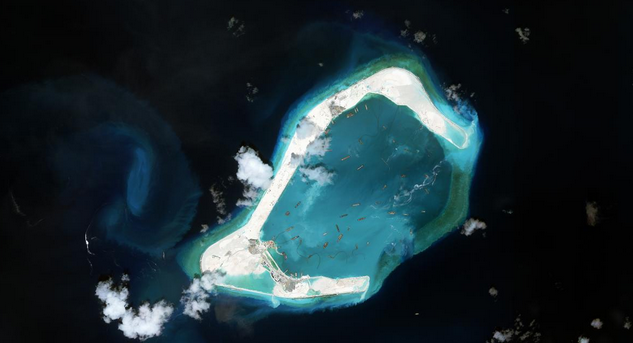Breaking
China combat-capable base alarms PH, Pag-asa Island

Zamora (Subi) Reef (Photo from the Asia Maritime Transparency Initiative)
MANILA – Recent satellite photos of the Chinese-occupied Zamora (Subi) Reef showed the construction of a combat-capable base, which included a 60-meter runway, alarming the nearby Pag-asa Island.
The Zamora Reef has been continuously widened, filling its surrounding waters with more sediments and sand. The reef’s growing size can allegedly accommodate a 3,300-meter runway.
Jose Custodio, a military historian, feared that the new air facility would enable China to gain more control over the South China Sea.
“We are in danger of losing Pag-asa Island because it’s such a huge base that the Chinese are constructing here. And if they are able to operate this, then they can practically seal off this area,” Custodio said.
“We will be then sucked into what China wants. They can actually hold our garrisons hostage to make us amenable to Chinese dictates… That is the problem of the next administration when this thing kicks in,” he added. “China can threaten and keep on applying pressure on Pag-asa Island that will make us come into terms with them.”
Pag-asa Island belonged to the Kalayaan Group of Islands, controlled by the Philippines. The island has about 200 Filipino residents. China, however, claimed that it was illegally occupied.
According to The Diplomat report, China could easily seize Pag-asa Island by disguising an invasion force as a flotilla engaged in combat training exercises. This fleet could veer off from its routine naval exercises and invade the nearby island.
Aside from China’s air facility in Zamora Reef, the country has also been building other structures in Burgos (Gaven), Calderon (Cuarteron), Kagitingan (Fiery Cross), Kennan (Chigua), Mabini (Johnson South) and Panganiban (Mischief) Reefs – all claimed by the Philippines.
China’s aggressiveness and defiance from calls to halt reclamation and infrastructure building on disputed territories in the South China Sea distressed its relations with the Philippines and other claimant states.
The Philippines, for its part, had filed an arbitration case before a United Nations (UN) tribunal, asserting that China violated the United Nations Convention on the Law of the Sea (UNCLOS).





















